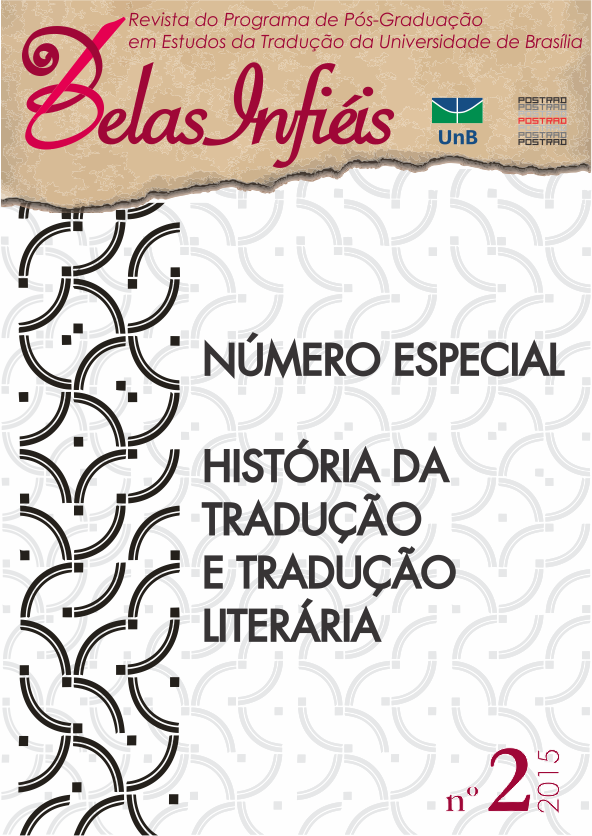O ESTADO E A DISTRIBUIÇÃO DE LIVROS PARA CRIANÇAS:
A LITERATURA TRADUZIDA NO PNBE
DOI :
https://doi.org/10.26512/belasinfieis.v4.n2.2015.11336Mots-clés :
tradução, literatura infantil, escola, Estado, PNBERésumé
O Estado brasileiro tem sido, historicamente, o grande cliente das editoras de livros para crianças. A literatura infantil brasileira surge, já em seus primórdios, vinculada à escolarização, e as escolas públicas são o primeiro reduto do mercado livreiro. Ao longo do pouco mais de um século de história da literatura infantil no Brasil, o papel do Estado e da instituição escolar seguem decisivos nos rumos do mercado editorial. Percorrendo essa trilha, refletiremos sobre a presença da literatura traduzida para a primeira infância (0 a 6 anos) no principal programa estatal de distribuição de livros de literatura ”“ o Programa Nacional Biblioteca da Escola (PNBE/MEC).
Téléchargements
Références
BERENBLUM, Andréa; PAIVA, Jane. Programa Nacional Biblioteca da Escola (PNBE): leitura e bibliotecas nas escolas públicas brasileiras / Secretaria de Educação Básica, Coordenação-Geral de Materiais Didáticos. Brasília: Ministério da Educação, 2008.
EVEN-ZOHAR, Itamar. Polysystem Studies. Poetics Today,vol. 11, n. 1. The Porter Institute for Poetics and Semiotics: Tel Aviv, 1990. Disponível em: <http://www.tau.ac.il/~itamarez/works/books/ez-pss1990.pdf>. Acesso em:04out. 2014.
HALLEWELL, Lawrence. O Livro no Brasil: sua História.São Paulo:T.A. Queiroz, 1985.
KOSHIYAMA, Alice Mitika. Monteiro Lobato: intelectual, empresário, editor. São Paulo: Edusp, Com-Arte, 2006.
LAJOLO, Marisa; ZILBERMAN, Regina. Literatura infantil brasileira: História e Histórias. 6ª Ed. São Paulo: Ática, 2007.
LEFEVERE, André. Mother Courage’s cucumbers: text, system and refraction in a theory of literature. Modern language studies, v. 12, p. 3-20, 1982.
________. Translation, rewriting and the manipulation of literary fame. Londres: Routledge, 1992.
O’SULLIVAN, Emer. Internationalism, the universal child and the world of children’s literature.In:HUNT, Peter. InternationalCompanion Encyclopedia of Children’s Literature. 2nded., vol. 1. Londres e Nova Iorque: Routledge, 2004.
PAIVA, Aparecida et al. Literatura na infância: imagens e palavras. Brasília: Ministério da Educação, Secretaria de Educação Básica; Belo Horizonte: UFMG, Centro de Alfabetização, Leitura e Escrita, 2008.
PAIVA, Aparecida (Org.); SOARES, Magda (Org.). Literatura infantil: políticas e concepções.Belo Horizonte: Autêntica, 2008.
PERROTTI, Edmir. Confinamento cultural, infância e leitura. São Paulo: Summus, 1990.
SERRA, Elizabeth D’Ângelo (Org.). 30 anos de literatura para crianças e jovens: algumas leituras. Campinas: Mercado de Letras. Associação de Leitura do Brasil, 1998.
SOARES, G. P. Bastidores da edição literária para crianças no Brasil entreos anos 1920 e 1960: a atuação de Lourenço Filho junto à Companhia Melhoramentos. In: DUTRA, Eliana Regina de Freitas e MOLLIER, Jean-Yves. (Org.). Política, nação e edição. Brasil, Europa e Américas nos séculos XVIII-XX. O lugar dos impressos na construção da vida política. 1 ed. São Paulo: Annablume, 2006, v. 1, p. 513-531.
VIEIRA, Else Ribeiro Pires (Org.). Teorizando e contextualizando a tradução. Belo Horizonte: FALE/UFMG, 1996.
ZILBERMAN, Regina. No começo, a leitura. Em Aberto, ano 16, n.69. Brasília, jan./mar. 1996.
Téléchargements
Publié-e
Comment citer
Numéro
Rubrique
Licence
Copyright Statement
Given the public access to this journal, the texts are free to use but requires the recognition of the original authorship and initial publication in this journal to be properly stated.
The journal allows the use of works published for non-commercial purposes, including the right to submit the work to publicly accessible databases. Published contributions are the sole and exclusive responsibility of the author(s).
- When submitting papers to be evaluated by the Belas Infiéis journal, the author(s):
- Declare that the contents of the contributions are original and of their original creation, being entirely responsible for their content if there is an objection by third parties.
- Claim to be aware that they should not commit academic plagiarism.
- Declare that the manuscript has not been published, completely or partially, in Portuguese or another language. If it is a translation it should be submitted to the Translated Articles section.
- Declare that the manuscript is not being evaluated by other journals.
- Declare that the manuscript was not submitted to another journal simultaneously.
- Commit(s) to inform the journal of any kind of error or inaccuracy in their contribution (published, in evaluation or in editing) and to collaborate with the editors to make due corrections of the article (when in evaluation or editing) or erratum/retraction (after publication).
- Declare that there is no conflict of interest regarding the published work.
- Authorize its release if it is accepted for publication without any kind of monetary compensation.
- Agree to assign non-exclusive rights to publication to the magazine, remaining free to make their contribution available in other media as long as the publication of the first version in Belas Infiéis magazine is mentioned. They also authorize Belas Infiéis to assign their texts for reproduction in content indexers, virtual libraries and similar platforms.
- Maintain copyright and grant the journal the right of first publication, the work being licensed under theCreative Commons Attribution License.
- Is/Are allowed and encouraged to publish and distribute their work online after the editorial process, which may increase the impact and citation of the published work.
- Authorize the editorial team to make textual adjustments and to adapt the article to the publication rules, when necessary.



















